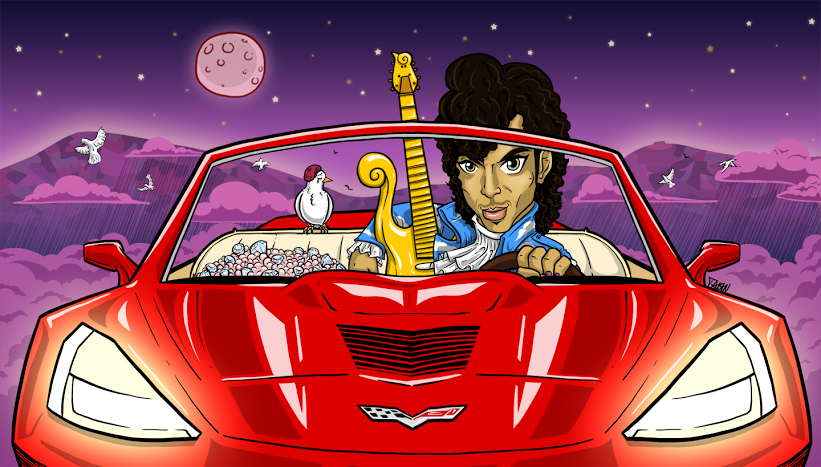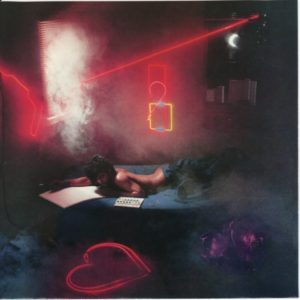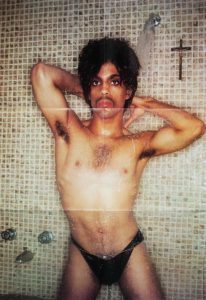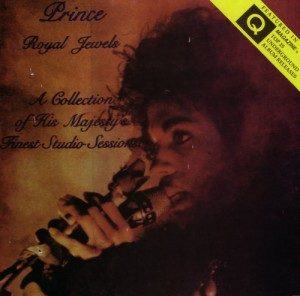Remembering Prince: music, mischief and our epic phone fight

My phone buzzed early that morning. It was a text:
Whaaaat?
What What?
Robin.
And then my phone rang. My friend Annabel broke the news (thankfully before I checked in with social media for the day) that Prince was dead.
Prince.
I did the math. It wasn’t June 7 yet, 2015 subtract 1958 and… 57. He was 57 years old.
I’ve since been bombarded, in the best possible way, by messages from people I’ve known throughout my life. And I think to accurately explain why, I’ve got to engage in a self-indulgent personal history. I need to begin with the origins of my Prince fandom in order for the once-in-a-lifetime 20-minute debate I had with him on the phone one day to make real sense.
In 1982 I was 11 years old; I was in 5th grade. Surely before then I had experienced Prince. I know by then “I Wanna Be Your Lover” was in heavy rotation at the local roller skating rink and that I’d enjoyed it, I just hadn’t identified the song as being Prince. 1982 was when I know he definitively entered my life. He clicked. “Little Red Corvette” had been released as a single and from the moment I heard it on the local radio station, I was hooked. I called them obsessively to request the song until, finally frustrated with being at the mercy of an establishment that clearly sought to limit my exposure to a musical god, I convinced my mother to buy 1999 for me.
 It was my prized piece of vinyl, played on my shitty, off-brand shiny silver turntable non-stop while I stared at and pathetically attempted to doodle the odd intricacies of the cover art and tried to understand my feelings about a naked Prince lying in his bed, preparing to draw, surrounded by lasers. I devoured that album, all four sides of it. “Free” was my lullaby; I’d put it on just before bed and wake up at some point in the night to the rhythmic cha-chunks of the needle hitting the end of the record.
It was my prized piece of vinyl, played on my shitty, off-brand shiny silver turntable non-stop while I stared at and pathetically attempted to doodle the odd intricacies of the cover art and tried to understand my feelings about a naked Prince lying in his bed, preparing to draw, surrounded by lasers. I devoured that album, all four sides of it. “Free” was my lullaby; I’d put it on just before bed and wake up at some point in the night to the rhythmic cha-chunks of the needle hitting the end of the record.
I saved my allowance and backtracked to “Controversy,” “Dirty Mind” “Prince” and “For You.” I read and listened and traced Prince’s roots and influences. He inspired my true musical education and led me to James Brown, Sly and the Family Stone, Santana, George Clinton, Jimi Hendrix, Joni Mitchell, Miles Davis.
I bought any magazine that made mention of Prince. I memorized useless trivia and likely a lot of misinformation. I cut out every picture, posting a few in my school locker and the others on my bedroom wall. In 6th grade, a few lockers down from mine, Michelle Williams had pictures of Michael Jackson. We were good enough friends, but the debate was a constant war between us. “Greatest entertainer in the world? Tell me, how many instruments does Michael play on his albums? Oh, how many of those songs did he write himself?”
On the weekends, my friend Sherry and I would ride our bikes to a nearby laundromat. They had video games and pinball machines. They had a jukebox that had “Erotic City” on it. We dumped piles of quarters in and played the track on repeat.
In 7th grade, one of my alleged best friends (a true frenemy) acquired tickets for us to see Prince in concert on the “Purple Rain” tour. A week before the big day, she decided we weren’t friends anymore and gave my ticket to someone else. It was a betrayal that stings even now. I scooped up any music I could find that was remotely related to Prince’s. I found 94 East, Mazarati, Jill Jones, The Family, Jesse Johnson. I found the recordings of Vanity before her songs and movie role went to Apollonia. In my backyard, my friends and I would practice the dance to “Sex Shooter” and – Lord help us – mimic the spastic grinding we saw him do onstage while he sang “Darling Nikki.” My poor mother! What she must have thought of a bunch of pre-teens practicing these incredibly sexual gyrating motions as we humped the grass.
I can’t pinpoint which song it was – I imagine it was “Jack U Off” – that my father finally caught me listening to, but he beat the PMRC by at least a year, banning “that filth” as long as I was “living under this roof.” I made the most of his business trips and used headphones the rest of the time.
 In 8th grade, I loaned that old frenemy a poster – the one that came with “Controversy.” It depicted Prince in a shower wearing nothing but black bikini bottoms with a gold necklace around his waist and a cross dangling by his crotch. She returned it by leaving it on my desk in my first period class, she told me. Yet it wasn’t there. When I asked my teacher about she told me she found pornography on my desk and had disposed of it accordingly. I protested by refusing to do homework, quickly flunking out of a class that required B or above.
In 8th grade, I loaned that old frenemy a poster – the one that came with “Controversy.” It depicted Prince in a shower wearing nothing but black bikini bottoms with a gold necklace around his waist and a cross dangling by his crotch. She returned it by leaving it on my desk in my first period class, she told me. Yet it wasn’t there. When I asked my teacher about she told me she found pornography on my desk and had disposed of it accordingly. I protested by refusing to do homework, quickly flunking out of a class that required B or above.
I had always been at least a little different – I was the only Jewish person in my school, trapped in bible belt Indiana being raised as a displaced New Yorker. Prince taught me it was more than okay to be different, it was preferable. I stopped trying to wear the clothes the popular kids wore, borrowing pieces of Prince’s style but really trying to develop one of my own. I used my ozone-destroying Aqua Net to spray the side of my hair up like Lisa and Wendy instead of forming the era-defining “claw.” And I studied the man’s music like my life depended on it, particularly the B-sides. “She’s Always in My Hair” and “17 Days” were as ingrained in me as “Purple Rain” was in anyone else.
In college, my obsession grew more acute. One of the single sexiest things that ever happened to me was having a guy I had an impossible crush on sing “When Doves Cry” to me. My first tattoo was a dove. My lower back is now covered in paisley.
My mom had given me a copy of one of her credit cards “for emergency use only.” She always had a hard time keeping a straight face when she would confront me with the bill. “How is $100 of Prince bootlegs an emergency, Robin?” she would ask as I unloaded a month’s worth of laundry into the washing machine and explained, as rationally as I could, that Prince playing with Miles Davis might not come along again and that the only way to truly understand “Lovesexy” was to hear it in relation to the forbidden “Black Album.” Without Spooky Electric, there could be no Camille. She, of course, had no idea what I was talking about, but that woman certainly loved me enough to know that it meant something to me.
It took me what seemed like forever to finally see Prince perform live. Oddly, I have no recollection of my first concert, or how I first discovered his after shows. I have these crystal clear memories of specific moments though: Prince pointing to a full moon behind us at Deer Creek in Indianapolis before playing “What if God Was One of Us,” Chaka Khan, Larry Graham, George Benson and Prince beginning a show at Irving Plaza in NYC at 4am. “Call the babysitter!” I remember addressing a group of my friends from the jamband scene and insisting “You’ve seen the Dead, you’ve seen Phish, you’ve seen a million shows at the Wetlands, but you have never seen a real jam band. Come with me,” then watching as their skepticism turned to awe as we watched Alicia Keys, ?uestlove, George Clinton, Doug E. Fresh, Larry Graham and more accompany Prince until 4am.
When I was working at MTV, the news spread quickly that he would appear on TRL. He was TAFKAP then. I was in the audience that day, sitting by the door, watching preparations. I caught a glimpse of the cue cards, and face palmed when I read the first one.
“Is it okay if I call you Prince?”
I kept my mouth shut, but I knew that Carson Daly was about to make an ass of himself on his own show. The Artist handled it with mildly condescending humor, answering to the effect that he was gonna call him whatever he wanted so he might as well. There was an unspoken “jackass” at the end of his statement.
 About a year ago, out of the blue, my partner asked me “What’s your favorite Prince song.” I paused. “When Doves Cry”? “Girls and Boys”? “Starfish and Coffee”? “Nothing Compares 2 U”? “17 Days”? “Erotic City”? “Don’t Play Me”? “Anna Stesia”? I ran through a huge mental list of hundreds of songs, but I knew I was avoiding facts. “It’s an obscure kinda unreleased song,” I finally admitted. “Souly-A-Colia.” “Of course, snob.” Fair enough. My favorite Duran Duran song is “Secret Oktober.” It’s not intentional.
About a year ago, out of the blue, my partner asked me “What’s your favorite Prince song.” I paused. “When Doves Cry”? “Girls and Boys”? “Starfish and Coffee”? “Nothing Compares 2 U”? “17 Days”? “Erotic City”? “Don’t Play Me”? “Anna Stesia”? I ran through a huge mental list of hundreds of songs, but I knew I was avoiding facts. “It’s an obscure kinda unreleased song,” I finally admitted. “Souly-A-Colia.” “Of course, snob.” Fair enough. My favorite Duran Duran song is “Secret Oktober.” It’s not intentional.
That said, Souly-A-Colia’s not even a song. It’s just how I first saw “Rebirth of the Flesh” listed on a bootleg vinyl collection known as “Royal Jewels” and I just can’t seem to break the habit of calling it that. It’s a dirty funk beat with practically non-stop horns, playful vocals and a chorus that, once I hear it, is in the back of my head for at least a month. It’s not the best song he ever wrote, it’s not the most meaningful or the most inventive, but it’s definitely the one that makes me the happiest.
These are the things rushing through my mind as I sort through my emails, texts and phone calls since Prince passed away on April 21. These are the things I’ve been dreading sitting down and typing out because they’re mine and they’re all I have now and to join the great public mourning feels, to me, like letting them go and allowing them to belong to everyone. My friends all know me well enough to know that this is the one for me, the great artistic loss. My former boss has been texting me updates on his state of mind. When I interviewed with him years ago, we discovered this shared adoration. I’d never met anyone who was as involved with Prince as I was. I’m convinced Prince got me that job when I was hired.
This mourning is devastatingly real.
I remember when I came home from backpacking Europe in 1995. I was lugging a backpack as big as I am, wearing one of a handful of outfits I’d been rotating for a month and had only washed a couple times and my leg hair was… I can’t even imagine what my parents thought when they first saw me. I was ready to regale them with stories of my adventures when they hugged me hard and suggested we go out to eat. Looking (smelling) like that? We ordered our food and when the waiter was gone they got incredibly serious. “We have some bad news,” they said. And every awful thing I could think of that would impact my family shot through my mind. “Jerry Garcia died while you were away.” I’d been following the Dead for a few years and this was oddly important to me. When David Bowie passed away recently, I felt that feeling of profound loss again. I didn’t even know these guys personally, right? And yet it hurt in a deep and sincere way.
This is different. I think it’s different for a lot of people. It’s fascinating – in a cold, scientific way – to see how people are reacting to the news of Prince’s passing compared to how we treated David Bowie’s. And of course the circumstances are like apples and oranges [smirk, you’ll get it in a minute] since Bowie in many ways left on his own terms, knowing it was coming and setting us up for the most genuine, artistic, meaningful goodbye imaginable while Prince, well… But what strikes me is the way we are seeing the public mourning take place online, on social media. With Bowie we shared songs, we read articles about his genius and particularly about the artistry he demonstrated before he went. With Prince, we’re sharing the songs, of course, but the stories are overwhelmingly personal.
We’re, yes, reading about the investigation into his death, the possibility that opiates were involved and rehashing the emergency landing his plane made in Illinois the week before. Major magazines are trotting out their “last interviews” with him alongside their tribute obits. Think pieces are touching on his impact on individuality, gender-bending, and style. Still, whether they’re being told by fellow musicians or critics or everyday people, they’re being told almost entirely in the first person. Even more prevalent than that are the stories we’re getting from folks like ?uestlove and Andre Cymone and Prince’s band teacher. We’re reading about the person who opened a Tower Records early so Prince could shop and the person who DJed in a hotel bar for Prince and his date.
“I was once in a room that Prince was in” is not a silly start to a story right now. We’re seeing the first interview Prince ever gave in his high school paper. We’re seeing a picture of Charlie Murphy and Prince from the day that inspired the hilarious and apparently accurate Chapelle Show sketch. We’re rewatching clips of Prince being interviewed by Chris Rock, Prince being interviewed by Kevin Smith. We’re seeing in one place now a lot of different facets of Prince’s personality and trying to understand more than the genius of his music, but the man himself, through the compilation of these encounters and impressions.
And the reason a lot of my friends are getting in touch with me, sending me notes as if a family member has left me and asking if I’m okay, I think, is because I was blessed to have a special moment with Prince. It’s one that taught me that there was a whole other side to a man I thought I knew through his interviews and music and onstage persona. I share it not to brag, though it’s hands down #1 on my most rock’n’roll moments list and it’s certainly the coolest thing that’s ever happened to me. I share it because I think that the experience reinforces what the world is starting to understand about him as an everyday person.
I had written an article about “Rave Un2 the Joy Fantastic” along with Ani DiFranco’s “To the Teeth” (they were on each other’s albums and they came out around the same time). I had written about a lot of music by artists of whom I consider myself a fan, and I had even written about Prince before, but this time felt important. I took a lot of care to make sure I was getting it right, that I was being fair – not a rabid fan, but not the teacher who’s harder on her own kid than the rest of the class fair. I was proud of where I landed.
Then my phone rang at work.
“Are you sitting down?” It was Prince’s publicist.
“Yes.”
“Prince wants to talk to you.”
Is it good or bad? She doesn’t know. Is it about the article? She doesn’t know. I give her my home phone number and tell her tomorrow will work. I tell my boss I’m not coming to work tomorrow. When he asks why, I tell him the truth. He understands.
I have sticky notes up around my apartment, anywhere I might pass as I pace, which I tend to do when I’m on the phone. They all say “He’s just a man.” My heart is beating so hard I think it’s exploding. He’s just a man. I call the number I’ve been given.
“Paisley Park”
I greet Jackie, as I’ve been told that’s who will answer the phone. We exchange pleasantries then she says “Let me see if I can find him.”
The line clicks.
He’s not Prince, I remind myself. He’s the Artist. Don’t say his name!
He begins the conversation in a way that avoids the situation completely.
He thanks me for the “nice words” in the Village Voice. He asks me if I’ve done a lot of writing. I tell him I have, then fail to tell him about another article I wrote about him. He asks if I’ve ever written a book. “No… not yet,” I say just like that. He asks if I’m under contract and then reiterates “So you could write a book if you wanted to.”
What the…?
Then he asks when I first heard “Sign O’ the Times.”
I tell him that I can’t remember when I first heard it but when I did, it didn’t catch me. However, when I was a freshman in college looking through my tapes one day, I realized how much of it I didn’t know, that I couldn’t believe that I could look at titles and not know all the words, so I popped it in and fell completely in love with it.
I tell him that happens sometimes with him, that I’ll be stuck in the past when I first listen to a new album. “And you’re not,” I say.
“How come people never write like that. How come they don’t say ‘I’m stuck in the past?’ instead of ‘We don’t do work as good as previous work?'” he asks.
I know now what he’s calling about. He’s honed in on, literally, the last paragraph of the article, in which I noted:
These returns to form clearly set Rave and Teeth above the current pack. Yet ultimately, within the duo’s respectively tremendous oeuvres, they don’t really quite rank up there with, say, Sign O’ the Times or Living in Clip. A few years back in “The Truth,” the Artist bragged, “My only competition is me in the past.” Like everything else about him, I guess the same goes for DiFranco. Fine. So let’s see them top it.
I state it as simply but honestly as I can: that all of the songs on “Rave” are good enough and it’s a good album, but it’s not as tight an album as “Sign.”
“In the climate that’s happening today, How does ‘To the Teeth’ and ‘Rave’ stack up to those albums?” he asks.
I tell him that I hope this came across in the article, that, in my opinion, these albums are absolutely better than most of what’s out today. I mean it, too. After all, I’m a huge fan.
But that’s not really what’s eating him. It’s the comparison to himself that’s compelled him to call.
“I made ‘Sign O’ the Times.’ I did it,” he says, “And I don’t have to be better than myself.” That’s the gist of it anyway, it takes him a few minutes of emphatically explaining that. And once he has, he switches into an analogy so that maybe I can understand this better… because he’s not stating an opinion, he’s speaking truth. He tells me this throughout the conversation. I am speaking opinions and he is speaking truths.
“It’s like apples and oranges. I can make an apple. I can make an orange. They have different tastes.”
“Right, but if they have different tastes then you’re going to like one taste better than the other. Aren’t you?” I challenge.
He’s not having it. I stick to my guns.
“If you put them side-by-side I’ll probably pick the orange more times than the apple.”
“Really?” he asks genuinely.
“Yeah.”
“Does it make it better though, honestly?”
I pause.
“It’s just a straight question, it just deserves a straight answer.”
“In terms of perception, for me, yes.”
“Really?!”
“It doesn’t make it universally better.”
“Wow”
“But see you’ve gotta understand also that with an article…”
“An orange… is better… than an apple…”
“For me.”
“For you.”
“Yeah.”
“Who made apples and oranges?”
I’m in it now, right?
“Awww, see now you’re gonna get into religion.”
“It’s not religion at all, where do you think they came from?”
“Honestly, I don’t think about where they came from….”
“Aha!” I can hear him smiling.
“Because it doesn’t matter the fact is they’re there.”
“Let’s pretend that they were created, just for discussion sake. Would you tell the person or being or whatever ‘This one’s better. You did a better job with this one.’?” he asks. “You don’t see the complete irony in that at all?”
He. Wait. He’s making himself God in this analogy, right? Of course he is.
Would I say that? I admit that I would…with a caveat.
He describes a picture of that creator’s eyebrow going up. I can only see him raising his.
“Well with the disclaimer, with the understanding when I make that statement that I can’t speak for anyone else but myself? For me? Yeah, for me, sir, the orange is better than the apple.”
He’s not backing down, but he’s being playful about it.
I bring it back to the article. I tell him that the understanding when a critic is writing an article is that this is one person’s opinion. But that for me, if you put this album side-by-side with “Sign O’ the Times,” I’m gonna pick the latter more often than not. But sometimes, I’ll pick “Rave.”
He doesn’t understand why they need to be side-by-side at all. I’m trying to explain context to him. I’m trying to explain that not everybody is familiar with all of his music and that, while I find comparisons generally lazy when I review albums, in this case it’s more about putting not the style of the songs or the album into context, but the experience of listening to it… “for me.”
He’s still not satisfied. He tries to move from fruit to racism. Do I believe that some groups of people are better than other groups. Of course I don’t, though in retrospect I might have gotten away with telling him I think Prince fans are better than those who don’t get his music. He might have softened.
He’s getting more and more playful, even as the conversation gets more and more intense. He tosses in a “C’mon sistah” in when I pause to phrase an answer.
I offer an apology at one point if I’ve offended him. He assures me he’s never offended. He’s trying to help me.
“I wanted to know if whether you really saw the silliness in better and worse. There’s no such thing.”
I clarify: I never said better or worse, but I do believe in preference.
“Preference has nothing to do with better or worse.” he says.
“Did I use the words better or worse?”
“You said doesn’t rank up there.”
“It doesn’t rank up there for me. I prefer to listen to…”
“Better or worse,” he insists, then tickles me with “Come on home, mama, I’m right here. Come on home.”
“You’ve been watching too much of the debates on CNN,” I say.
“Remember when they called Joni Mitchell’s album the worst album. It’s like that did something to her, and psychologically she could have handled it better, but nevertheless it’s a waste of time by people who had nothing to do with the creative process.”
I stumble through a dreaded moment of talking about faith and belief and, let’s just say it’s awkward and I come off like a moron. But I rally when we start talking about his artistic motivation.
I’m clear that I understand him, that he, and Ani and artists in general do not go into their process trying to one-up themselves, and that I, as a fan, don’t expect them to go into a studio or to write a song trying to be better or different than what they’ve done in the past. But I tell him that he has to understand that as listeners, we don’t absorb his music in a vacuum. It exists relative to the other stuff that’s out at the moment and, possibly more importantly, relative to what he’s done before.
Lemme ask you a question,” I say. “When you go to your record collection to pick an album that you’re gonna listen to, and say, I’m not sure who you would say your favorite artist is …”
“I get what I’m in the mood for and I get it based on what you said, preference. It’s not based on ‘Oh Kind of Blue’ is a better album than ‘Sketches of Spain.’ Are you kidding? I mean they’re two different kinds…
“I never said better.”
“Miles doesn’t have to rank up to himself. That’s a silly notion. It’s as silly as the day is long.”
He asks if we can agree on that.
I tell him I don’t know.
“Well if you do call me back and we can talk about some future projects. You know what I’m saying?”
We chat a few minutes more. He tells me he felt a connection to me when he read the article. I’ll hold onto that statement for the rest of my life. I’ll also question my ability to read between the lines. Did I blow a chance to co-write his autobiography. I believe I did.
But, I remember that sticky note. “He’s just a man.” And I’m just a fan, and a writer, who challenged the one artist I’ve admired more than any other and who stuck up for herself when he didn’t like it. And I have to believe that he respected that. After all, he helped to teach me to be this way.


Leave a comment